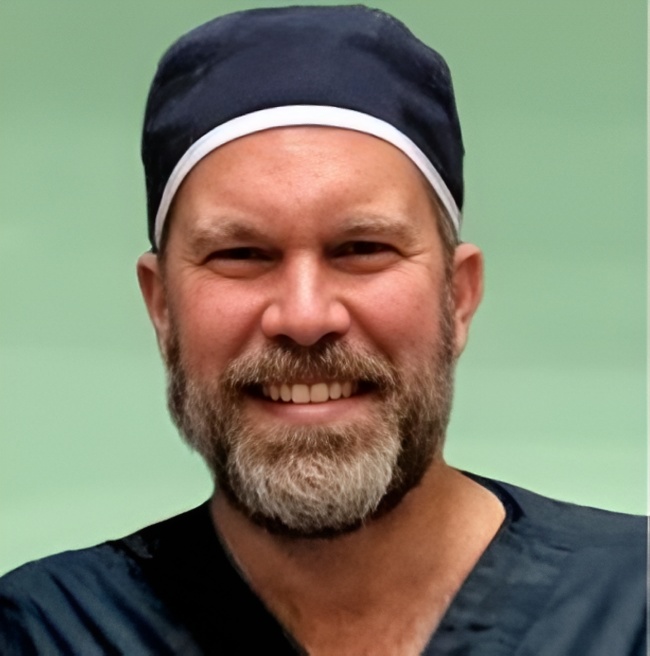Professional Experience
Dr. Orr’s clinical history demonstrates long-standing service in ophthalmology, including surgical practice, outpatient care, and leadership in regional eye services.
- Current position: Senior ophthalmologist and director of regional ophthalmic services (private clinic and surgical practice)
- Clinical focus: Cataract surgery, laser refractive procedures (LASIK), retinal injections and management, emergency eye care
- Practice duration: Practising ophthalmology since the mid-1990s
- Patient volume: Extensive clinical caseload with tens of thousands of patient encounters over his career
- Leadership roles: Clinic director, mentorship of junior clinicians and coordination with local optometry services
Academic Contributions
Academic and teaching activities support Dr. Orr’s role as a knowledgeable clinician. Where public records do not list formal publications or university posts, his training and mentorship remain evident through teaching in clinical settings.
- Teaching roles: Supervision and training of residents and clinical staff in surgical technique and patient care
- Lectures and courses: Participation in continuing medical education and local training events for community practitioners
- Research interests: Clinical outcomes in cataract and refractive surgery, retina disease management (where applicable)
- Conference speaking: Presentations to regional clinical audiences and professional meetings when engaged
Areas of Expertise
Dr. Orr treats a broad range of eye conditions. The list below highlights common clinical problems he manages and explains them in patient-friendly language.
- Cataracts: Removal of clouded lenses to restore clearer vision; often performed as an outpatient procedure with intraocular lens implantation.
- Laser refractive surgery (LASIK and related procedures): Correction of nearsightedness, farsightedness and astigmatism to reduce dependence on glasses or contact lenses.
- Macular degeneration and retinal disease: Diagnosis and treatment of age-related macular degeneration, diabetic retinopathy, and other retinal conditions using injections, laser therapy or surgical interventions when needed.
- Emergency eye care: Rapid assessment and treatment for acute vision loss, retinal detachments, or serious eye injuries.
- Comprehensive eye care: Regular follow-up, vision rehabilitation, and coordination with optometrists for long-term eye health.
Publications and Research
Evidence of peer-reviewed publications and formal research can strengthen clinical authority. Public sources do not list a comprehensive publication record for Dr. Orr; patients or peers seeking detailed research outputs may consult medical literature databases or professional profiles for further verification.
- Peer-reviewed articles: No complete public list available in reviewed sources; search PubMed or institutional repositories for potential publications under his name.
- Book chapters or textbooks: Not publicly listed in available summaries.
- Research summaries: Where research exists, it would typically focus on clinical outcomes in cataract, refractive and retinal care; direct database searches are recommended for exact titles and abstracts.
Patient Care Philosophy
Dr. Orr’s approach to patient care emphasises clarity, empathy, and shared decision-making. He focuses on educating patients, discussing realistic outcomes, and ensuring each treatment plan is tailored to the individual.
- Communication: Clear explanations of diagnosis, step-by-step treatment plans, and expected recovery timelines.
- Empathy and respect: Attentive listening to patient concerns and preferences throughout diagnosis and treatment.
- Patient education: Offering pre-procedure consultations and thorough post-operative instructions to support recovery.
- Accessibility: Collaboration with local optometrists for follow-up and coordination of care for out-of-region patients where practical.
- Testimonials and outcomes: High patient satisfaction reported in clinic summaries; individual case outcomes vary and are discussed during consultations.
Professional Affiliations
Memberships and certifications affirm Dr. Orr’s clinical standing and commitment to professional standards and continuing education.
- Royal College of Physicians and Surgeons of Canada: Fellowship/Certification in Ophthalmology (FRCS(C)).
- College of Physicians and Surgeons of Ontario (CPSO): Licensed physician in Ontario with active registration.
- Professional practice: Membership in relevant national and provincial ophthalmology societies is typical for practising specialists (specific committee roles were not available in public summaries).
FAQs
- Is Dr. Orr board-certified?
- Yes. Dr. Orr holds specialty certification in Ophthalmology (FRCS(C)) from the Royal College of Physicians and Surgeons of Canada.
- What types of surgeries does he perform?
- He performs cataract surgery, laser refractive procedures (such as LASIK), retinal treatments including injections for macular degeneration, and emergency ophthalmic interventions when indicated.
- Does he treat international patients?
- Public summaries do not explicitly confirm international patient services; however, many clinics can accommodate out-of-region patients through pre-consultations and coordinated care—contacting the clinic directly is advised for confirmation.
- How long is the typical hospital or clinic stay?
- Most refractive and cataract procedures are outpatient and require only short clinic stays. Retina surgeries or emergency procedures may require longer monitoring depending on the specific treatment and patient health.
- What languages does Dr. Orr speak?
- English is the primary language of practice. Additional language information is not listed in the public summaries reviewed.
- How can I schedule a consultation?
- Patients typically schedule consultations through the clinic’s appointment office. Contact details and appointment procedures are provided by the clinic’s administrative team.
- What should I expect during a first visit?
- The initial visit usually includes a full ophthalmic examination, a review of medical history, diagnostic testing as required, and a discussion of treatment options tailored to the patient’s condition and goals.







